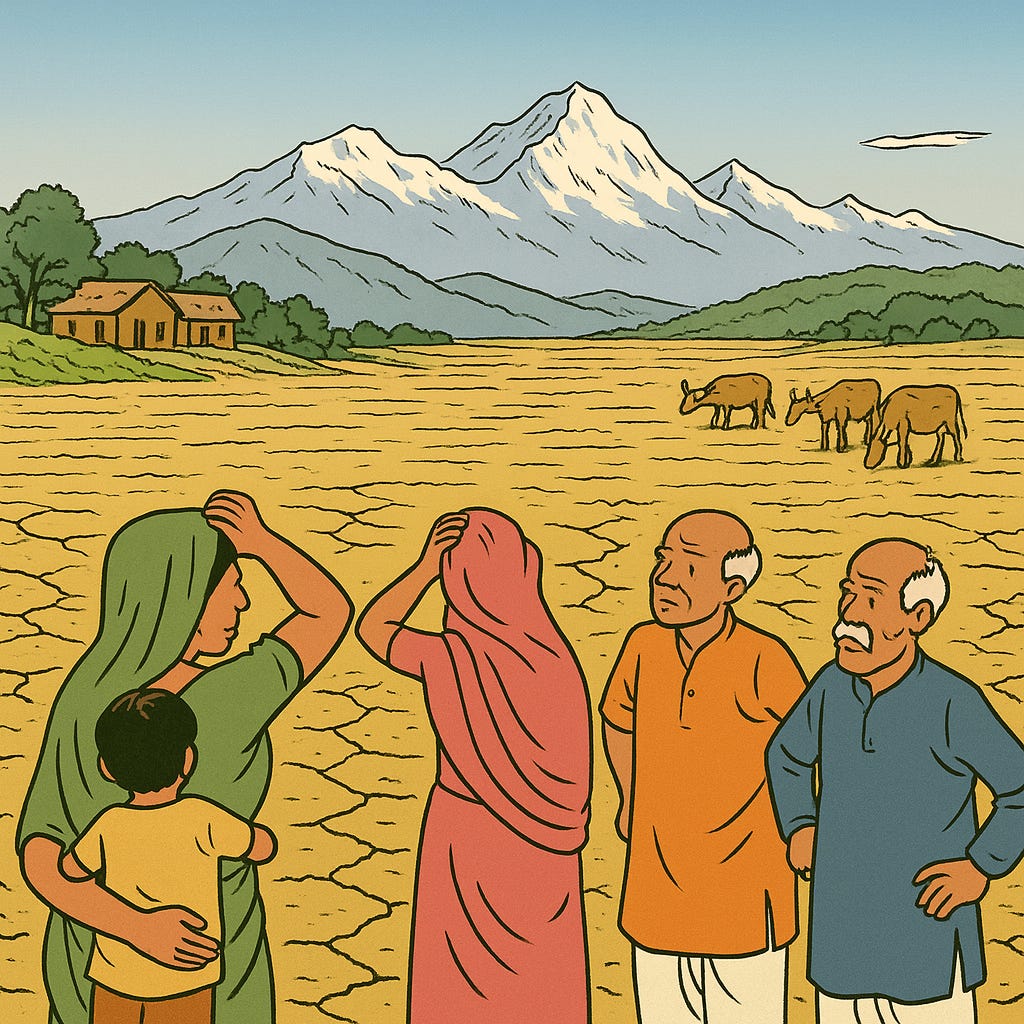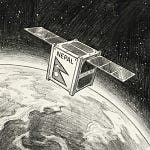Share the love! Help others that care about Nepal stay up to date the easy way. If you like this issue, share it with a friend who follows Nepal and hit Subscribe for your weekly dose of curated, can’t-miss updates.
Trade booms and washed-out highways, AI debates and drought cries—Nepal's juggling act keeps us on our toes! While the Tarai thirsts for policy solutions and global diplomacy tests our principles, diaspora stars shine bright from Manila to Wall Street. Let's dive in! 🚀
Economy & Development 💸
Nepal's trade relations with India are poised for critical discussions as Prime Minister KP Sharma Oli prepares for his upcoming visit, with Minister for Industry, Commerce and Supplies, Damodar Bhandari confirming that resolving bilateral trade challenges will be a top priority during high-level talks, according to MyRepublica. These diplomatic efforts gain urgency as Nepal grapples with starkly contrasting economic realities: while the country celebrates an 81.8% surge in total exports to Rs277 billion this fiscal year—driven overwhelmingly by re-exports of edible oils like soybean and palm oil (which Nepal doesn’t produce domestically)—its domestic sectors continue to struggle with minimal growth. Edible oil exports alone skyrocketed 15-fold to Rs 121.53 billion, representing 43.86% of total exports, highlighting how Nepali traders exploit zero-tariff privileges for least-developed countries even as locally manufactured goods see sluggish 6.62% growth.
Domestic production tells a sobering story of uneven sectoral performance: exports of rosin and resin acid climbed 39.23% to Rs 2.05 billion, footwear surged 54.20% to Rs 2.04 billion, and handmade paper rose 19.76% to Rs 1.22 billion, while traditional staples like ready-made garments and large cardamom declined sharply, reports KTM Post. This volatility underscores the limitations of government initiatives like the Nepal Trade Integration Strategy, which aims to diversify exports but remains hampered by chronic under-funding and implementation gaps, leaving Nepal’s economy precariously dependent on re-export mechanisms rather than sustainable domestic industries.
Infrastructure fragility further complicates economic recovery efforts, as relentless monsoon rains have completely severed eight major highways—including the Koshi Highway in Sankhuwasabha and Araniko Highway in Sindhupalchowk—while forcing critical corridors like the Kaligandaki and Prithvi Highways into hazardous one-way operations, according to TRN. Nepal Police Headquarters warn that these disruptions threaten supply chains and exacerbate inflationary pressures, just as NEPSE’s record-breaking market capitalization of Rs 5 trillion (82% of GDP) signals paradoxical investor confidence, reflecting the complex interplay between Nepal’s infrastructure vulnerabilities and its speculative market optimism.
Politics & Governance 🏛️
Political unease is simmering in Nepal following reports that the country is nearing an extradition treaty with India, sparking concern among opposition leaders after a recent home secretary-level meeting between the neighbors. Compounding the tension, similar reports suggest plans to expedite construction of a high dam on the Koshi River, triggering nationalist outcry over sovereignty concerns. According to MyRepublica, these developments have intensified political scrutiny of Nepal-India relations at a sensitive time. Meanwhile, technical cooperation between the two nations has progressed elsewhere, as evidenced by the successful 7th meeting of the Nepal-India Boundary Working Group in New Delhi, where both countries agreed on updated modalities for boundary pillar maintenance using new surveying technologies, with future meetings scheduled in Nepal (TRN).
Shifting focus to innovation, Nepal's political parties are actively engaging with artificial intelligence as a development tool, with the Nepali Congress recently initiating a discussion series titled "AI: Overall Analysis for Nepal's Development" at their central office in Sanepa, Lalitpur. Exploring both advantages and challenges of AI integration, this reflects growing recognition among Nepal's leadership of technology's crucial role in national progress. The convergence of diplomatic negotiations and technological advancement highlights Nepal's complex balancing act between traditional geopolitics calls for modernization, according to The Rising Nepal (TRN). As noted in reports, the Boundary Working Group's continued collaboration since its 2014 establishment demonstrates institutionalized cooperation even as newer topics like AI policy emerge in Nepal's developmental discourse.
Social & Cultural ⭐
The Rastriya Mukti Party Nepal (RMP-N) has issued a stark warning about the devastating drought gripping the Tarai-Madhes region, describing it as more than a natural disaster—rather the result of systemic exploitation and governmental neglect. According to THT, party leader Anil Mahaseth emphasizes this has created an "existential crisis" where wells are drying up, farmlands face destruction, and households across the region experience "severe distress" with no water for children or cattle. The RMP-N statement directly attributes the catastrophe to long-term structural neglect, exploitation of water-forest-land resources, and uncontrolled degradation of the Chure region, creating conditions where the land has become "not only drought-ridden but also famine-prone and hopeless." The party has urgently called for comprehensive emergency relief measures, including food assistance, drinking water provision, and agricultural support implementing free electricity for water pumps and agricultural equipment.
Meanwhile, Nepal's engagement with the Middle East continues to evolve as the final batch of Nepali peacekeepers returned home from Iraq, marking the conclusion of Nepal's participation in the UN mission there, which officially ends December 31 (MyRepublica). Simultaneously, prominent civil society leaders have delivered a powerful appeal to Prime Minister KP Sharma Oli regarding Nepal's position on the Gaza humanitarian crisis, urging the government to condemn what they describe as genocide against Palestinians while acknowledging Nepal's own tragic loss of ten agricultural trainees in the Hamas attack (MyRepublica). The leaders argue that Nepal's silence on the Gaza situation "diminishes us as a modern-day nation-state" and undermines its moral authority on international issues, calling instead for Nepal to uphold its historical Panchsheel principles of non-alignment while taking stronger diplomatic action to protect both global human rights and Nepali citizens in conflict zones.
Diaspora & Globalization 🌏
Nepali talent Pravesh Rijal, a native of Biratnagar currently serving as Chief Data and AI Officer at Cross River Bank in the US, has been named to the prestigious AI100 list—an annual recognition of the 100 most influential artificial intelligence leaders in the United States MyRepublica . Rijal's remarkable achievement, hosted by AIM Research—a leading global analyst firm specializing in artificial intelligence—highlights the significant contributions of Nepali professionals in cutting-edge technology fields. With a career that began at Citigroup and advanced academic credentials including a Master's degree in Financial Engineering from New York University while pursuing a PhD in Quantitative Finance, Rijal exemplifies the global impact of Nepali diaspora excellence at the intersection of AI and financial services.
Community unity took center stage in Manila as the Non-Resident Nepali Association (NRNA) Philippines recently held its general assembly and induction program at the Pearl Hotel Manila MyRepublica . The July 29 event marked a significant celebration of leadership and the enduring connection among Nepalis living in the Philippines, bringing together community members to embrace new vision and renewed commitment. The gathering featured cultural performances by Nepali students and showcased the vibrant presence of Nepalis across various sectors including healthcare, education, and business in their adopted homeland.
These stories from different corners of the world—whether recognizing individual excellence in technology or celebrating collective strength through community organizations—paint an inspiring picture of the Nepali diaspora's global footprint. Rijal's achievement in the competitive AI industry demonstrates the heights Nepali professionals can reach internationally, while the NRNA Philippines event underscores how community bonds remain strong and active thousands of miles from home. Together, these narratives reinforce how Nepalis abroad continue to make meaningful contributions while maintaining strong cultural ties, serving as ambassadors of Nepal's talent and unity on the world stage.
Let’s connect
Enjoying this issue? 📩 Share it with a friend & let’s keep Nepalis worldwide in the loop! Got thoughts? Hit reply—we’re all ears! Or let us know what you think via our Feedback form or follow us on Facebook | LinkedIn
P.S. Got a story or issue you'd like us to cover next week? Drop us a reply — we're building this space together.
About Nepali Diaspora Digest:
The Nepali Diaspora Digest connects the global Nepali community with curated news, insights, and stories that matter most. Join us as we celebrate and explore the diverse voices and achievements of Nepalis worldwide.
Partner shout out
belayat.uk: helping Nepalis connect in the UK on jobs, housing, events and finding local Nepali owned businesses














